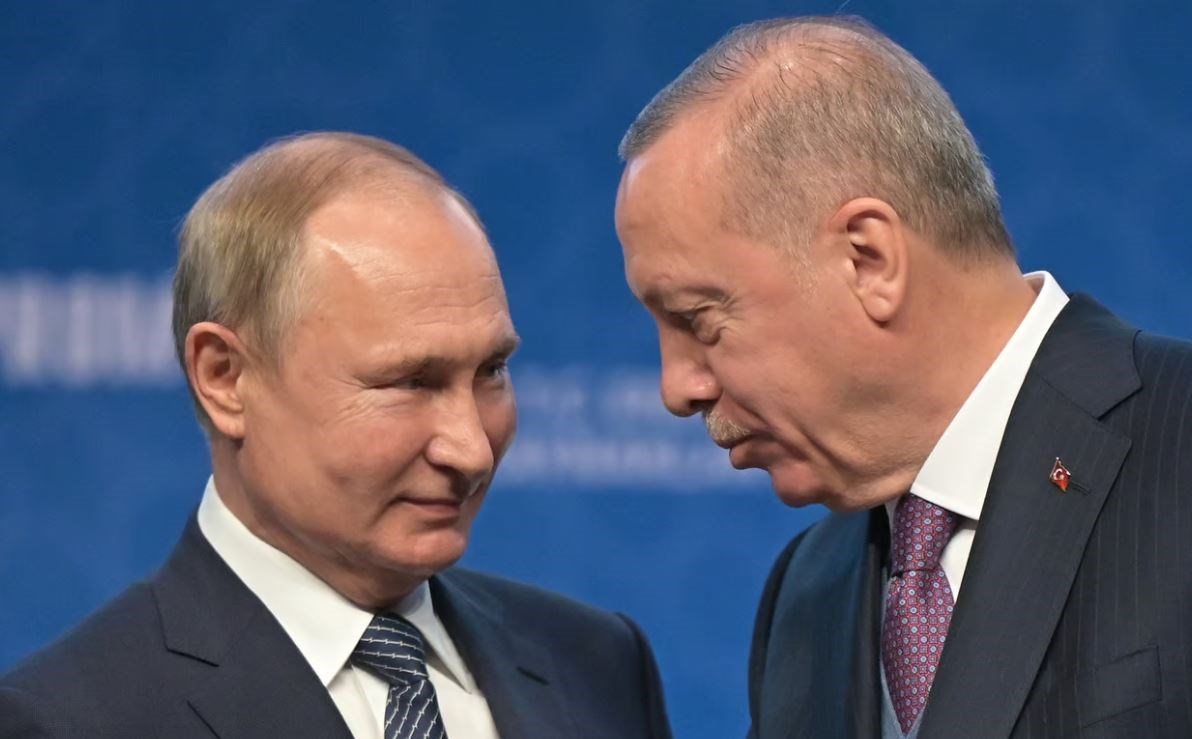Putin-Erdogan dialogue holds key to grain deal's fate
The forthcoming discussions between Russian President Vladimir Putin and Turkish President Recep Tayyip Erdogan are poised to exert a substantial influence on the grain deal, with the United Nations overseeing the deliberations.
-

Russian President Vladimir Putin (left) and Turkish President Recep Tayyip Erdogan attend an inauguration ceremony of a new gas pipeline "TurkStream" on January 8, 2020 in Istanbul (AFP)
The forthcoming discussions between Russian President Vladimir Putin and Turkish President Recep Tayyip Erdogan will play a crucial role in determining the fate of the grain deal, with oversight from the United Nations, Sputnik reported, citing an insider familiar with the negotiations.
This comes shortly after Kremlin spokesperson Dmitry Peskov announced that the meeting between Putin and Erdogan would occur in the near future, while a diplomatic source in Ankara confirmed it would take place in early September before the G20 summit.
The same source noted that the negotiations hold significant promise and are expected to clarify the grain deal's future trajectory. Various relevant departments in Turkey are actively engaged in the process, and coordination with the United Nations ensures close monitoring of the talks. The source expressed optimism for constructive negotiations that could pave the way for the revival of the initiative.
Earlier, another source involved in the negotiations revealed that Turkey and the United Nations are exploring options to engage in talks with the Russian delegation regarding the grain deal in Istanbul. The source emphasized ongoing efforts to establish the groundwork for the meeting, including formulating specific proposals for discussion through appropriate communication channels. The continuous engagement highlights the commitment to finding a viable resolution in this matter.
Read more: Erdogan says grain deal revival depends on 'West keeping its promises'
Still no dates set for purported talks on Grain Deal: Sources
Sputnik reported last Thursday, citing sources close to the matter, that there are still no specific dates set for the purported talks between Turkey, Russia, and the UN on the Black Sea Grain Deal in Istanbul.
The grain deal expired on July 18, and Russia did not renew its participation due to the West failing to guarantee its end of the deal, according to Moscow.
Russian authorities said that most of the grain was being delivered to Europe instead of countries that are in need the most.
On July 28, the Russian leadership expressed during a Russia-Africa Summit that Russia remains committed to assisting Africa with its food and energy needs.
On August 11, Russian Agriculture Minister Dmitry Patrushev said that Russian grain will be delivered to Africa free of charge in the near future.
"We will supply grain to African countries free of charge. So far, we are talking about six countries and supply volumes from 25,000 to 50,000 tons. I think that these deliveries will be carried out in the near future," Patrushev indicated.
Read more: First cargo ship leaves Ukraine's Odessa after grain deal termination
The grain deal: Benefit for the rich, impact on the poor
The grain deal facilitated the export of around 33 million tonnes of grain from Ukrainian ports to global markets.
According to an investigation by the Austrian website eXXpress, nearly half of the wheat and grain sent from Ukraine to the EU ended up feeding the pigs in Spain that produced the renowned and pricey jamon.
However, international watchdogs have repeatedly warned that the lion's share of the food produced was delivered to the West, leaving poor countries with less than one-third of the exports. The UN itself admitted the disproportionality through its coordinator who maintained that developing and impoverished nations received only 10 percent of corn and 40 percent of wheat, while rich countries obtained 90 percent of corn and 60 percent of wheat.
Concurrently, Russian President Vladimir Putin warned that most of the grain exports found their way to the European Union instead of developing countries. Addressing this issue, Putin announced that Moscow is ready to export potash fertilizers to low-income nations, especially in Africa, free of charge.

 4 Min Read
4 Min Read










